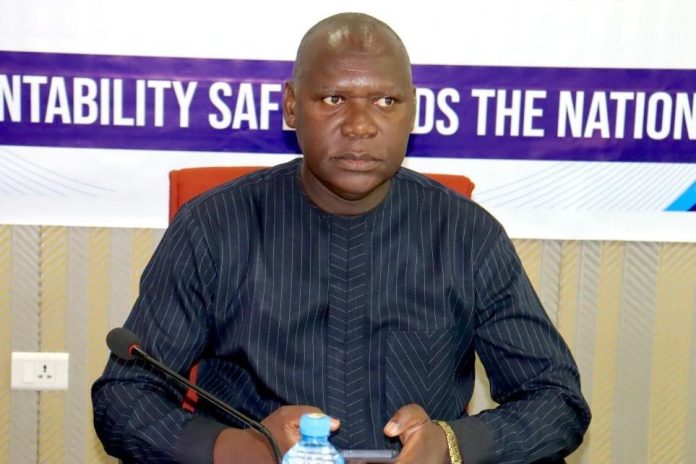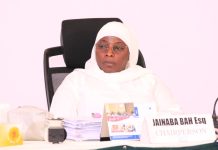By Kebba AF Touray
The former Registrar General, Alieu Jallow, has admitted before the National Assembly’s Special Select Committee on the Disposal of Former President Jammeh’s Assets that he and his team only took inventory of 36 landed properties of former President Yahya Jammeh despite a document from the Ministry of Justice listing 131 properties.
Mr. Jallow, who appeared before the Committee on Wednesday, 30th July 2025, disclosed that although he was the Registrar General and appointed as receiver of Jammeh’s assets by the High Court, he was not served with the court’s custodial order.
During the session, Lead Counsel Aji Saine Kah asked Mr. Jallow: “Are you aware of the landed properties that were placed under your custody by the High Court?” He responded, “I don’t remember the specific assets that were listed to be part of my custodial holdings. So, what I know is that the order clearly stated that I was to have custodial control of all movable and immovable assets.”
When Counsel Kah referred Mr. Jallow to a list of properties—annexure marked MOJ 5A from the Ministry of Justice—she asked, “Do you recognize this document?” Mr. Jallow answered, “I’m seeing the annexure for the first time today.”
Counsel Kah then asked, “Did you ever receive or were you ever served with the order of the High Court granting you custodial powers over the landed properties of former President Jammeh?” Mr. Jallow responded, “No.”
Asked further, “What did you do as Registrar General to ensure the execution of that particular order which was directed to your office?” Mr. Jallow said:
“They first convened a coordination meeting of the stakeholders that were involved, who were to deal with the execution of the orders. He lamented that these included the receivers of the companies from the livestock marketing agency, non-receivers as part of the task force that was subsequently established, which included the office of the sheriff, the security, specifically the soldiers. Everything I did from start to where I ended, immediately after the meeting ended, I also generated an internal memorandum to that effect and brought it to the attention of the honorable Minister of Justice before we go into operations.”
Asked whether he had a copy of the memo, Mr. Jallow replied, “I could not trace it. I have been moving from one thing to another in the process.”
When the lead counsel asked if he was aware of the number of landed properties listed in the annexure, Mr. Jallow answered, “Yes.” She asked again, “Do you know the number of landed properties that were identified by the Ministry of Justice in that document?” Mr. Jallow said, “One hundred and thirty-one.”
Counsel Kah pointed out that despite 131 properties being identified, his team only took inventory of 36. She asked, “So then, what do you have to say to this?” Mr. Jallow responded, “It was during their transaction, we were not supposed to end with that, if it were not for the fact that we deferred to the commission’s team, we would have proceeded our investigations of landed properties.”
Mr. Jallow explained that the work of his team was overtaken by the Janneh Commission once they realized that the Commission was also dealing with Jammeh’s properties. Counsel Kah then asked him, “So are you suggesting that you did not complete your inventory of the landed properties because the commission was in existence and conducting the same work?” Mr. Jallow replied, “Correct.”
She asked, “But you were appointed by a High Court?” He responded, “Yes.”
“You do agree that a High Court order is a court order?” she asked. He responded, “Absolutely.”
The Lead Counsel then asked, “So what happened to that court order that was directed to you?” Mr. Jallow said, “Yes, we did not receive the court order.”
She then followed up: “And you did not make any effort to follow up with the Attorney General?” Mr. Jallow replied, “No, we did not.”
In his earlier responses, Mr. Jallow said that he served as Registrar General from November 2014 for almost four years. He said he started his career at the Ministry of Justice in 2012 after working with the national broadcaster for 12 years. At the Ministry, he held several roles including State Counsel, Registrar of Companies, Curator of Interstate Estate, and Executive Secretary of the National Agency for Legal Aid.
When asked to report on the landed properties of former President Jammeh in Banjul, the Kanifing Municipality, and the West Coast Region, Mr. Jallow said his team visited 36 landed properties in the three areas. He explained that some of the properties were unoccupied while others were occupied by tenants.
He confirmed that properties allegedly belonging to General Sulayman Badgie, Asumana Badgie, and Jammeh’s sister were among those visited. When asked whether the 36 were the only properties his team visited or if additional properties existed, he responded, “These are the ones we covered by the time the commission also came on board and as we were doing this, we in fact did not know that the commission was also doing the same thing, so when they knew that they had to defer to the commission’s team.”
When asked whether he believed that there were still other properties of the former president not taken into inventory, he answered, “Of course yes.”
He was also questioned about the issuance of notices of eviction and how many properties were under physical occupation by his team. He could not recall the number but said that the Department of Physical Planning had records of that. He said the properties under their physical control were given to Physical Planning, who acted as caretakers.
Counsel Kah asked, “Were all the 36 properties eventually handed over to the Physical Planning?” Mr. Jallow responded, “Yes.”
Asked what happened to the rental income generated from these properties, he said that he had no control over the collection of rent. “We were never involved in the collection of rents,” he said.
Pressed further on whether they ever questioned who was collecting rent on Jammeh’s properties during his custodianship, Mr. Jallow answered, “No.”
Counsel Kah pointed out that a court order designated him as receiver and custodian of Jammeh’s properties and asked whether he was supposed to be in charge of all the assets, including income from them. Mr. Jallow said, “My understanding of the court order was to take control, have custody of the landed properties, and hand them over to a state institution.”
Asked if he considered rent collection part of the control of the property, he answered, “No.”
In conclusion, Counsel Kah asked, “Is it your testimony before this committee that out of the 131 properties, you only took custody of 36?” Mr. Jallow replied, “Yes.”
She asked again, “Are you aware of what happened to the rest of the properties?” Mr. Jallow answered, “No.”
The Committee’s hearings into the disposal of Jammeh’s assets continue, with more public officials expected to testify on how the assets were managed and whether due process was followed.



















